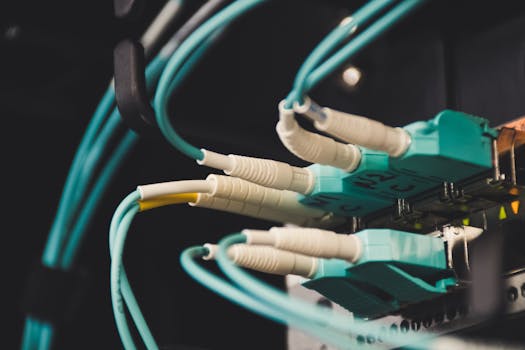
From Copper to Fiber: The Revolution of Internet Infrastructure in Africa
From Copper to Fiber: The Revolution of Internet Infrastructure in Africa is transforming the digital landscape of the continent. The shift from traditional copper-based internet infrastructure to fiber optic technology is enabling faster, more reliable, and widespread internet access. This revolution is crucial for Africa’s economic growth, social development, and global competitiveness.
The African continent has long been plagued by slow and unreliable internet connectivity, hindering economic growth and social development. However, with the advent of fiber optic technology, the situation is changing rapidly. Fiber optic cables are being laid across the continent, connecting major cities, towns, and rural areas. This has resulted in a significant increase in internet penetration, with more people having access to faster and more reliable internet services.
History of Internet Infrastructure in Africa
The history of internet infrastructure in Africa is a story of gradual development, from the early days of copper-based connectivity to the current era of fiber optic technology. In the 1990s, African countries began to establish their first internet connections, using copper-based infrastructure. However, this technology was limited in terms of speed, reliability, and scalability. As the demand for internet services grew, the need for more advanced infrastructure became apparent.
In the early 2000s, African countries began to invest in fiber optic technology, recognizing its potential to provide faster, more reliable, and scalable internet connectivity. The first fiber optic cables were laid in North Africa, connecting major cities such as Cairo, Tunis, and Casablanca. Since then, the deployment of fiber optic cables has expanded to other parts of the continent, including Sub-Saharan Africa.
Benefits of Fiber Optic Technology
The benefits of fiber optic technology are numerous, and they have contributed significantly to the growth of internet infrastructure in Africa. Some of the key benefits include:
Fiber optic cables offer much faster internet speeds than traditional copper-based infrastructure. This has enabled Africans to access a wide range of online services, including video streaming, online banking, and e-commerce.
Fiber optic technology is more reliable than copper-based infrastructure, with less downtime and fewer outages. This has improved the overall quality of internet services, enabling Africans to stay connected and productive.
Fiber optic cables are more scalable than copper-based infrastructure, allowing for easier upgrades and expansion. This has enabled African countries to increase their internet penetration rates, connecting more people to the digital economy.
Challenges and Opportunities
Despite the progress made in deploying fiber optic technology, there are still challenges to be addressed. Some of the key challenges include:
The cost of deploying fiber optic cables is high, making it difficult for some African countries to invest in this technology. However, the benefits of fiber optic technology far outweigh the costs, and many countries are exploring innovative financing models to support deployment.
The lack of infrastructure in rural areas is a significant challenge, with many communities still lacking access to basic internet services. However, the deployment of fiber optic cables is helping to bridge this gap, connecting rural areas to the digital economy.
The development of digital skills is critical to ensuring that Africans can take full advantage of the internet. Many African countries are investing in digital literacy programs, enabling citizens to develop the skills they need to succeed in the digital economy.
Conclusion
In conclusion, the revolution of internet infrastructure in Africa is transforming the continent’s digital landscape. From copper to fiber, the shift is enabling faster, more reliable, and widespread internet access. While there are still challenges to be addressed, the benefits of fiber optic technology are clear, and many African countries are making significant progress in deploying this technology. As the continent continues to develop its digital infrastructure, it is likely that we will see significant economic growth, social development, and global competitiveness.